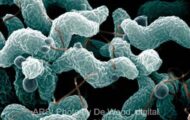The Food and Drug Administration (FDA) is planning to establish a Cooperative Agreement with the North Carolina State University Department of Poultry Science and the Piedmont Research Station Poultry Unit to study the safety of shell eggs in the U.S. market. The 2009 Egg Safety Rule was designed to prevent foodborne illness caused by eggs contaminated with Salmonella Enteritidis. The Agreement will research routes of transmission for Salmonella in the egg production industry. The agreement will go into effect in September 2013.
 Scientists are hoping to investigate how changes in physical feed characteristics and housing could influence Salmonella transmission. Findings will help researchers and the egg industry understand routes of Salmonella transmission and food safety controls needed to help prevent outbreaks.
Scientists are hoping to investigate how changes in physical feed characteristics and housing could influence Salmonella transmission. Findings will help researchers and the egg industry understand routes of Salmonella transmission and food safety controls needed to help prevent outbreaks.
The last major outbreak of Salmonella caused by shell eggs was in 2010. About 1,939 people were sickened with Salmonella Enteritidis from May 1 to November 30, 2010. But Salmonella infections caused by eggs happen even when there isn’t a specific outbreak. The baseline number of reported Salmonella infections caused by contaminated eggs is about 50 per year. Given that the multiplier for Salmonella is 30.3, that means at least 1500 Americans are sickened by Salmonella infections caused by eggs every year. In addition, at least 1 in 20,000 eggs is contaminated with Salmonella. That doesn’t sound like much until you realize that 75 billion eggs are produced in the U.S every year. That means 3,750,000 eggs sold every year carry Salmonella.
Salmonella bacteria can actually be inside the egg because the bacteria can exist within the hen’s ovary or oviduct. To protect yourself against Salmonella in shell eggs, never use cracked or damaged eggs, cook all eggs to 160 degrees F, keep eggs refrigerated, and keep raw eggs and ready-to-eat foods separate. The bacteria is usually in the yolk, so, despite most recipe recommendations that you cook the egg until the white is solid and the egg is beginning to set, eating soft cooked eggs is not safe.




